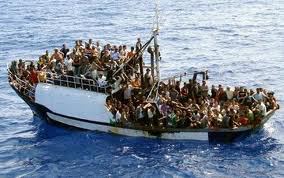
It was an act of blatant intolerance. Mia, a factory worker originally from Asia, had been warming her lunch-break meal in the microwave oven in the staff kitchen. It had been the only comfort she was allowed, since her factory job was menial and since she lived with a son who slept all day and stayed out all night. Suddenly, she faced a factory foreman, who found the aroma of her homemade food offensive and he posted a sign on the front of the microwave to point that out.
“No foul-smelling food allowed,” was all the note said.
This scene stuck with me from one of the films, “Plants out of the Sunlight,” on view during the Roxy Theatres’ annual Worldwide Short Film Festival last Wednesday night. The scene proved all the more ironic, because the intolerant foreman was played by actor Colin Murphy, who’s lived and worked in Uxbridge for many years. Following the screening of the film, the audience at the Roxy had a chance to ask questions of actor Murphy and the producer of the film Vu Van Nguyen.
It turned out that Nguyen’s family had moved to Canada during the surge of immigration following the U.S. withdrawal from Southeast Asia at the end of the Vietnam War.
The so-called “Boat People” immigration saw over a million homeless families flee from that region to Europe and North America. What Nguyen did not know, until that night at the Roxy, however, was that Colin Murphy’s family had been among the most accommodating Canadian families in the country at the time.
“I told Nguyen that we had taken in a Vietnamese family,” Murphy said. “And my mother and father sort of adopted them until they could get along on their own.”
It’s 30 years ago that the Murphys of Uxbridge took in the Banhs of Vietnam. A few years ago, when Ted Murphy died, Vi Tu (the Banh son who later returned to Uxbridge to establish his optometrist practice) spoke at Ted’s funeral. Vi Tu recalled that his refugee family had spent more than nine months on a deserted island in Indonesia. The family’s worldly goods amounted to the mom’s wedding band, the dad’s watch and $20 U.S. Vi Tu remembered the first meeting of the two families at Pearson Airport on a cold January morning in 1980.
“We were exhausted, dehydrated and malnourished,” he said. “We had no idea what was going to happen.”
For the next year and a half, the Murphy family pitched in to make the landing of the Banh family as comfortable and uncomplicated as possible. Mr. Banh remembered that the Murphys took care of everything for them – from repairing a leaky faucet to introducing the newcomers to ice-skating.
Eventually, when the Banhs found work in Toronto, the Murphys helped them resettle. The elder Banhs – the father a janitor for 22 years at the Toronto district school board, the mother packaging chocolate for 25 years – went on to raise seven children, who grew up to become a pharmacist, a lawyer, a dental hygienist, a computer engineer, two dentists and an optometrist – Vi Tu Banh.
I had a connection with the Boat People about the same time. Not nearly as hands-on as the Murphys, but just as heart-felt. As a writer in Edmonton at the time (1980), I worked with CBC producers to organize a nationwide fundraiser; it was one of the first network TV telethons ever staged in Canada.
My writing partner – Colin Maclean – and I scripted material for weeks in preparation for the western Canadian staging of the show. We rehearsed hosts, singers, dancers, comedians and full orchestras. We had no idea whether the show would work. But it did.
The telethon captured the imagination of the country. And remarkably, in 1980, during a period of economic downturn in this country, the broadcast raised hundreds of thousands of dollars in public pledges, which numerous provincial governments matched.
In each of the two years when immigration of the Boat People peaked, 50,000 Vietnamese refugees arrived in Canada. Both in communities and on the air across the nation during our TV fundraiser, Canadians welcomed a generation in need. As a TV variety writer, I don’t think I ever experienced more rewarding work as writing that show.
All this came flooding back as I watched Vu Van Nguyen’s film, “Plants out of the Sunlight,” with bad-guy Colin Murphy making life miserable for Mia, his co-worker. It was an interesting bit of acting, since the truth was as far from that “foul smelling food” note and that act of intolerance, as they could be.
Colin Murphy’s true life experience – and that of so many Canadians then and since – has been to welcome immigrants in need… especially since most of us (or our ancestors) once faced those dire straits ourselves.
On your short story sbout the Canadian Kangaroos ln the Zoomer. I wondered if you knew about the book written by a member of that regiment, Kenneth R.Ramsden published in 1998.
Ken was a fellow retired employee at Sears and lived near me in the farm country outside Peterborough,Ont.and gave me a copy of his book that I found most interesting. It gave in detail the establishment of the carrier but also the day by day battles it was used in.